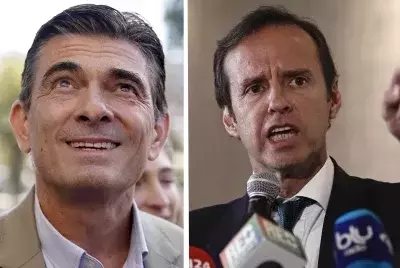
The recent presidential election in Bolivia has culminated in an unexpected runoff, a pivotal moment that signifies the end of over two decades of entrenched left-wing governance in the Andean nation. This development also highlights the electorate's cautious approach to radical shifts towards the right. The upcoming second round of voting will pit a centrist newcomer against a seasoned right-wing figure, promising a dynamic and closely watched contest that could redefine the nation's political landscape.
Bolivian Electoral Landscape Transformed: Centrist Emerges as Key Contender
On a significant Sunday in August 2025, specifically on the 18th, the political narrative of Bolivia underwent a dramatic transformation. In the vibrant city of La Paz, preliminary electoral results unveiled a stunning outcome: Senator Rodrigo Paz, a centrist with a dark horse appeal, garnered a surprising lead. Although he did not secure an outright victory, his performance surpassed that of his more established right-wing rivals. This turn of events sets the stage for an unprecedented second round of presidential elections, scheduled for the 19th of October, marking Bolivia's first such runoff since its return to democracy in 1982.
Paz, a respected former mayor, has advocated for a more tempered approach to economic reform, aiming to alleviate the severity of austerity measures proposed by the opposition to resuscitate Bolivia's ailing economy. His opponent in the runoff will be the right-wing former President Jorge "Tuto" Quiroga, who secured the second position in the initial vote. With over 91% of the ballots tallied, Paz had secured 32.8% of the vote, while Quiroga trailed with 26.4%. To avoid a runoff, a candidate needed either over 50% of the vote or 40% with a 10-point lead. "Always Bolivia, everything for Bolivia," Paz jubilantly declared to his supporters, emphasizing that "This economic model must change." Quiroga, flanked by his family, extended congratulations to Paz, proclaiming, "What happened is unprecedented. Bolivia told the world that we want to live in a free nation. It's a historic night."
This election dealt a significant blow to the long-dominant Movement Toward Socialism (MAS) party, which had largely controlled Bolivian politics since the rise of its charismatic founder, former President Evo Morales, in the early 2000s. The official MAS candidate, Eduardo del Castillo, finished a distant sixth with merely 3.2% of the vote, while another prominent leftist candidate, Senate president Andrónico Rodríguez, managed only 8%. Morales' nearly 14-year tenure saw the expansion of Indigenous rights and the channeling of natural gas revenues into social programs. However, his attempts to prolong his presidency and allegations of misconduct gradually eroded public trust. The once-stable Bolivian economy, under Morales' successor President Luis Arce, then experienced a severe downturn, marked by soaring inflation, fuel shortages, and a crippling scarcity of U.S. dollars for essential imports. This economic turmoil, coupled with internal power struggles within the MAS party, created a window of opportunity for the opposition, despite their initial struggles to unite behind a single candidate.
Paz's unexpected ascendancy to the forefront has also highlighted a prevailing ambivalence among Bolivian voters regarding a drastic shift towards the right. Unlike Quiroga and businessman Samuel Doria Medina, who advocated for the sale of Bolivia's vast lithium reserves and reliance on International Monetary Fund loans, Paz has maintained a more nuanced stance, though he has been a vocal critic of MAS's state-directed economic policies. Doria Medina, who failed in his fourth presidential bid, expressed no regrets, stating, "I wanted to serve Bolivia as president, and it hasn't been possible." While Paz is presented as a fresh face, he hails from a family deeply entrenched in Bolivia's political heritage. His father, former President Jaime Paz Zamora, navigated a complex political journey from leftist revolutionary to an unexpected alliance with a right-wing party, even serving as president from 1989 to 1993. This historical context underscores the intricate and often paradoxical nature of Bolivian politics, as the nation now contemplates a potential return to fiscal conservatism after years of populist economic policies and a re-evaluation of its international alignments, especially with the United States.
From a journalist's perspective, this election signals a profound political awakening within Bolivia, illustrating a mature electorate's desire for balanced governance. It's not simply a rejection of the left but a nuanced demand for stability and sensible economic management, devoid of extreme ideological swings. The emergence of a centrist candidate like Paz, with deep roots in the political establishment yet promising a fresh approach, reflects the public's yearning for leadership that can navigate the complexities of economic recovery without sacrificing national sovereignty or social welfare. This runoff is more than just a political contest; it is a referendum on Bolivia's future direction, a clear indication that the people are ready for a leadership that prioritizes pragmatism and a cohesive national vision over partisan divides.
